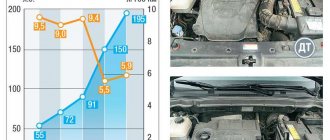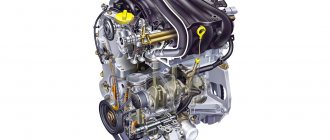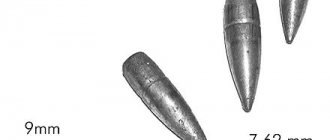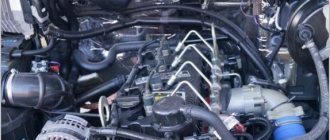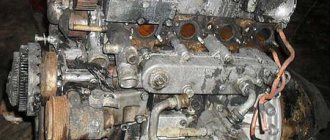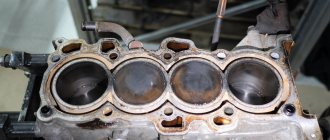Diesel or gasoline? For some reason, Russian motorists rarely ask this question. Yes, a Russian buyer can think for a long time about the brand of a car, its color, equipment, engine power and other characteristics, but if you ask him about his preferred type of engine, he will most likely say without hesitation: “Gasoline!”
It’s quite strange to see such unanimity when half of Europe drives diesel cars. Let's figure out which is better: diesel or gasoline, and why the second option is preferred in Russia.
What is the fundamental difference between gasoline and diesel engines?
To understand which is better: gasoline or diesel, it would be nice to first find out how these types of power plants differ from each other.
The main difference between gasoline and diesel engines is the method of ignition of the fuel. In both cases, the fuel mixture is under pressure, but in gasoline engines it ignites from a spark from a spark plug, and in diesel engines it ignites spontaneously from strong and dynamic compression.
The process of fuel combustion also takes place in different ways:
In a gasoline engine, the fuel mixture burns quickly, almost instantly. With such a flash, a considerable part of the energy is spent on detonation processes inside the engine, and not on performing useful work.
The main characteristic of gasoline is the octane number (ON) - the ability to resist detonation (self-ignition) when the pressure in the combustion chamber increases. The higher the octane rating, the more efficiently gasoline burns and the less fuel is emitted in the exhaust gases.
In a diesel engine, fuel burns slowly, which ensures smooth piston stroke and more efficient use of diesel fuel. Perhaps you have noticed that at low speeds, a diesel car always pulls better than its gasoline counterparts? This “responsiveness” of the engine is achieved precisely due to the smooth combustion of the fuel.
The quality of diesel fuel is determined by its cetane number (CN). The higher the central frequency, the smoother the fuel mixture burns.
You can distinguish diesel from gasoline by the characteristic vibration and knocking that appears at idle. Manufacturers are doing everything possible to minimize these noises, but if you previously drove a gasoline model, then when you switch to a diesel one, you will immediately feel the difference.
So what do we get? Gasoline cars are more powerful and accelerate faster, but diesel cars are more economical, develop more torque and perform well at low speeds.
Dual mass flywheel
Dual-mass flywheels are installed on diesel and gasoline cars. But in the first case they wear out faster. The reason for this is not only the high engine torque and vibration. Frequent engine starting and driving at low speeds also cause flywheel wear. The operational resource can be preserved only with stable, smooth engine starting and the use of medium engine speed ranges.
Diesel or gasoline: ecology and safety
It is not for nothing that Europeans choose diesel: this type of gasoline is more environmentally friendly compared to gasoline. The main part of the exhaust of a diesel car is soot, that is, carbon compounds. Soot decomposes quickly and does not harm nature. As for gasoline, when it is burned, lead compounds and other hazardous substances are released into the atmosphere.
When it comes to fuel, it is somehow not customary to remember its safety. However, gasoline was and remains a flammable fuel. One spark or elevated temperature is enough for its vapors to ignite. This is why after a serious accident people are in such a hurry to leave the car: if there is a fuel leak, the car can instantly turn into a burning torch.
At the same time, diesel fuel requires very high temperatures to ignite spontaneously. It’s not for nothing that there is a joke that diesel is good enough to put out matches. Of course, it is not worth testing this judgment in practice, but there is some truth in it. Diesel is more fireproof than gasoline.
Diesel or gasoline: the financial side of the issue
How economical are diesel models and why are they always more expensive than gasoline ones?
Motor
When a buyer decides whether to choose diesel or gasoline, first of all he looks at the cost of the car. And for diesel it is consistently higher.
The increased cost of diesel is caused by the design features of the engine. To withstand high pressure, all parts of the connecting rod and piston group must have a large margin of safety. Accordingly, fuel equipment must be more reliable and more expensive. Because of this, the diesel engine (and neighboring components) is more expensive and also more massive. Additional material costs are another argument in favor of increasing the price of a diesel engine.
Fuel consumption
As for fuel, the advantage here is on the side of diesel. Longer range - less fuel consumption. On average, in terms of fuel consumption, diesel is 45–65% more economical than its gasoline counterparts. Significant difference?
Diesel fuel itself is somewhat more expensive than gasoline, although the difference between diesel fuel and, for example, AI-95 is not so significant; with the same maximum mileage, the cost of diesel fuel can easily be covered by low consumption.
Engine durability
Another financial aspect is the longevity of the engine. When choosing which is better: gasoline or diesel, it is important to understand that diesel engines can last 4 times longer than gasoline engines. However, their maintenance is performed at least 1.5 times more often. Consequently, you will have to spend more on consumables.
Repair
When it comes to buying a new car, the choice between gasoline and diesel is obvious: the second option looks preferable. However, a practical person always looks forward. We must not forget that after some time breakdowns inevitably begin and the car has to be repaired. And at this moment, many happy owners of diesel cars suddenly become unlucky.
This is because while spare parts for gasoline engines are always available quite quickly, for diesel engines you have to wait weeks for them. Diesel models are not very popular in Russia, so original parts for them cannot be found in every car service center. Let's say more: not every employee of such a service is competent in the matter of repairing diesel engines. It is easier to find non-original parts, but it is not a guarantee that they will be of high quality. Quite the contrary.
Ultimately, due to their “scarcity”, factory spare parts for diesel engines are too expensive, and services charge more for repair work.
In addition, the ordeal of shopping and services will give even the most balanced driver a heart attack. Well, or to the point of obscene language.
Advantages of a diesel engine
Now, based on the information presented above, you can safely move on to studying the advantages and disadvantages of diesel engines. Let's start, traditionally, with the pros:
- Efficient fuel consumption.
- Increased resource.
- Gravity “at the bottom”.
- Environmentally friendly.
- Lack of ignition system.
- No tendency to overheat.
- Low fire hazard.
If everything is clear to you from this list, you can go straight to the disadvantages presented in the same list a little lower. For those who want to thoroughly understand the listed points, we will dwell on each of them in a little more detail.
Efficient fuel consumption
Let's start with the “delicious” part - the efficiency of diesel engines. Practice shows that a diesel engine consumes 35-50% less fuel than a gasoline engine of similar volume and technology. And the cost of diesel fuel and gasoline in our country is approximately the same, plus or minus a couple of cents. Accordingly, “feeding” a car with a diesel engine is one and a half to two times easier than its gasoline counterpart.
To be fair, we note that this situation awaits those who drive a gasoline engine and refuel with gasoline. If you install LPG (gas-cylinder equipment) on a car, then fuel costs will be approximately equal to diesel technologies. By the way, HBO can only be installed on gasoline engines. It is impossible to “stick” it to a diesel engine and save even more, since gas cannot be ignited without a spark, only with the help of pressure. But we will return to this a little later.
Where does such efficiency come from from a diesel engine? Why do you need more spark-igniting gasoline than diesel fuel, which doesn’t even need to be ignited? What is there in a diesel engine that cannot be implemented by analogy in a gasoline engine, and get at least a little “diesel efficiency”? And the “dog is buried” in the type of fuel itself and in its properties. Diesel fuel has more calories, burns longer than gasoline, and spends more energy on expansion rather than heating.
In total, a diesel engine owes its efficiency to the following factors:
- Diesel fuel has more calories, that is, you can get more energy from one liter than from a liter of gasoline.
- Due to the higher degree of compression required for self-ignition of diesel fuel, the latter burns more efficiently than gasoline.
- The combustion temperature of diesel fuel is lower than that of gasoline. Accordingly, less useless thermal energy is generated (it is not fire and temperature that pushes the piston, but the expansion of gases).
- The access of air to the cylinders of a diesel engine is not prevented by the throttle valve, without which it is impossible to prepare the correct fuel mixture of gasoline and air.
- In order to burn diesel fuel, you need less oxygen than in the case of gasoline. That is, a diesel engine will not stop running on a fuel-air mixture that is too lean (in the sense of its gasoline counterpart). Moreover, it won’t lose much in power either.
- The diesel engine operates successfully and produces great power at low speeds. This means that the engine does not need to be “spinned” in order to “squeeze the horses out of it.” And the lower the speed, the less energy is wasted on heating due to friction of parts.
As you can see, most of these factors are simply not available for gasoline ICE technology. Therefore, it is impossible to achieve the same efficiency.
Increased resource
Objectively, diesel engines can last longer before the next forced overhaul than gasoline engines. Many of you already understand some of the contributing factors. For a complete understanding, here is a list of them:
- The combustion temperature of the fuel is lower, which means the parts are exposed to less thermal stress.
- The average speed of a diesel engine is very modest compared to a gasoline engine. And the slower something spins and spins, the longer, even in theory, it will spin and spin.
- The hotter the engine oil gets, the worse it works (not to be confused with warming up a cold engine). The oil film in a gasoline engine is less stable and therefore less efficient. This means that it protects rubbing parts from wear less well.
There are other factors that have a positive effect on the increased service life of diesel power units. But they are less objective, and therefore can be considered insignificant.
However, one should not think that diesel engines are much more durable than their gasoline counterparts. The difference is felt only against the backdrop of long runs, measured in hundreds of thousands of kilometers. For example, if a diesel engine of any generation is capable of running 300 thousand before overhaul, then a gasoline equivalent of the same model year will “deflate” at around 200 thousand kilometers. We emphasize that this is just an example that allows you to clearly feel the difference. In life, the numbers can be completely different, as well as the difference between them.
Torque “at the bottom”
If you carefully read what was said in the paragraph about the efficiency of a diesel engine, you probably already understood where this torque at low speeds comes from. For those who find this topic difficult (there is absolutely nothing scary or offensive about this), we will repeat it again.
Diesel fuel burns more efficiently than gasoline, converting into usable energy in shorter periods of time than gasoline. Accordingly, in order to extract from the engine the horsepower necessary for starting from a stop or climbing a mountain, you do not need to “press your slippers to the floor.” The diesel engine starts pulling great almost from idle. Especially if it is an electronically controlled motor, where the dosage of diesel fuel is adjusted “smartly”. In addition, a diesel engine without any special tricks will not be able to “spin” too quickly. Diesel simply will not have time to burn out completely.
Environmental friendliness
This advantage of a diesel engine, such as environmental friendliness, is not of interest to all car enthusiasts. This is understandable. Against the backdrop of industrial enterprises, some little car emits an insignificant amount of harmful substances into the atmosphere. Moreover, this does not significantly affect the pocket or health of the owner of this very car.
And even if you think more globally than within your own garage, cars cause very little harm to the environment. Just a measly 3%. But is it so little because transport, in principle, cannot “outdo” energy and production? Not at all.
This indicator is the result of many years of work on improving the design of internal combustion engines. The struggle for the environment in this area continues today. And it will only intensify further. And in the case of diesel engines, it is easier for designers to do this, because the operating principle and properties of the diesel engine themselves contribute. Let's remember what was said above - diesel fuel burns more efficiently, turns into useful work better than gasoline, and accordingly, fewer toxins fly out into the exhaust pipe. Whether this is important to you is a matter for the owner, but it won’t hurt to keep it in mind.
You can argue with this advantage, which many people do with success. But we will not repeat this. Let's leave this topic to ecologists.
Lack of ignition system
In gasoline engines, the operation of which is impossible without an ignition system, this very system causes a lot of trouble. Surely many of you know what “no spark”, “the engine is running rough”, “the spark is such that you can kill a horse” and so on. All these colorful statements were generated by the ignition system. The one that either sparks early, then late, or skips the working stroke altogether. And there are also such problems as broken high-voltage wires, clogged (forgive the word, but there’s no way to describe it more accurately) spark plugs, water in the coil, incorrect clearances, and so on ad infinitum.
Diesel engines do not have these problems, since there is no system that creates them. Does this add reliability to a diesel engine? Not without it. Although the lack of an ignition system is more than fully compensated by the sophisticated fuel system of diesel engines. And yet - there is no ignition, which means there is another net advantage.
No tendency to overheat
Have you already been convinced of how much easier it is to understand something, having first spent nothing at all on studying the principle of operation and some of its features? Here again, if you carefully read what was written above, you will understand without further explanation why diesel engines are less prone to overheating than gasoline engines.
For those who haven't read it carefully, let's quickly summarize. The diesel engine operates mainly at low speeds, this time. Two - diesel fuel burns with less thermal energy than gasoline. The efficiency of diesel engines is higher, that is, more energy is spent on useful work rather than side effects, that’s three. Well, four - you will find out later, if you have the patience to read the article just as carefully to the end.
Low fire hazard
This is where the information presented above may cause some contradictions for many. And really, how can that be? After all, in order to ignite gasoline, candles are stuck into engines that produce a spark. And in diesel engines there are no spark plugs (except glow plugs, but they are not for ignition, but for heating the combustion chamber) - diesel fuel self-ignites. Moreover, the auto-ignition temperature of diesel fuel is approximately 50 degrees higher than that of gasoline.
So why, then, one might ask, do gasoline cars catch fire and explode statistically more often than diesel ones? It's all about fuel volatility. Volatility is, roughly speaking, the ability of a substance to evaporate. So, gasoline evaporates better, faster and more intensely than diesel fuel. Actually, when a car catches fire or explodes, it is not caused by liquid fuel, but by its vapor.
Interesting numbers
To clearly show how much it costs to maintain new petrol and diesel cars, we will provide some figures.
As an example, let's take two popular models that are sold in our country with both types of engines: Renault Duster in the Expression configuration and Citroen Grand C4 Picasso in the Tendance configuration.
Renault Duster
The cost of a new diesel car is 679 thousand rubles, a gasoline car – 614 thousand rubles. (Prices taken as of summer 2017).
According to the passport, the car consumes 5.9 and 5 liters of diesel fuel or 11 and 7 liters of gasoline for every 100 km in “city” and “highway” modes. If we take into account that the car will travel 20,000 kilometers in an average year, then 43,237 thousand rubles will be spent on fuel. (DT) or 73,512 thousand rubles. (AI-95).
In this case, a diesel model will have to undergo maintenance twice a year, while a gasoline model will need to undergo maintenance once. Consequently, 18.4 thousand rubles will be spent accordingly. and 8.3 thousand rubles. The results are in the table.
| Indicators in thousand rubles. | Diesel | Petrol | Difference |
| Car cost | 679 | 614 | 65 |
| Cost of annual fuel supply | 43,237 | 73,512 | -30,275 |
| Maintenance cost | 18,4 | 8,3 | 10,1 |
| Total | 740,637 | 695,812 | 44,825 |
As you can see, the annual maintenance of a new Duster with a diesel engine costs almost 45 thousand rubles. expensive.
Citroen Grand C4 Picasso
Let's do the same calculations for the Citroen Grand C4 Picasso minivan:
| Indicators in thousand rubles. | Diesel | Petrol | Difference |
| Car cost | 1104,9 | 994,9 | 110 |
| Cost of annual fuel supply | 33,8557 | 55,5424 | -21,6867 |
| Maintenance cost | 18,56 | 7,67 | 10,89 |
| Total | 1157,3157 | 1058,1124 | 99,2033 |
The final difference was more than 99 thousand rubles.
Diesel or petrol: used cars
There is an opinion that if you buy a used diesel car, then its use will be much more economical than in the case of a used gasoline car.
On the one hand, this is true. The type of motor on the secondary market has little effect on the price.
On the other hand, do not forget about repairs. If the car's warranty has long expired, you will have to repair the engine entirely at your own expense. If the car is too old, you often have to either buy another engine (new or used) or pay for major repairs of the existing one. And here three problems emerge at once.
Problem #1 : Trouble with the traffic police. It turns out that it is not so easy to re-register a car with a reinstalled engine. This applies to both gasoline and diesel cars.
Problem No. 2 : It is not a fact that a second-hand engine will be better than the old one.
Problem No. 3 : The cost of a diesel overhaul is not so affordable and will significantly hit the budget. This immediately negates all the advantages of buying a used diesel engine.
You might be interested in: Diesel or gasoline? Which is better for an SUV?
Therefore, if you choose diesel over gasoline, then definitely a new one.
Diesel or gasoline: who is more capricious?
In Europe this question is not asked, since, as a rule, there are no problems with fuel there. Everything is according to the standards, no confusion. And the climate there is relatively mild.
However, a diesel engine is always more demanding on fuel quality than a gasoline engine. Depending on the time of year, such a motor requires “summer” or “winter” diesel fuel. If you fill up at the “left” station, you’ll be able to take a taxi to work in the cold.
And the point is not even that at a gas station they can slip you a “summer” diesel fuel instead of a “winter” one. The quality of the fuel itself may be far from normal. Unfortunately, we often sell diesel engines that are so disgusting that they are only suitable for old domestic tractors.
The fuel equipment of modern engines fails immediately when low-quality diesel fuel gets into it. One clogged injector and you end up with expensive repairs. Injector cleaning is carried out under high pressure on special stands costing several million rubles. It’s clear that you won’t find such a stand in every car service center.
Even if we take into account that you have enough money for periodic “reanimation” of the engine, are you ready to choose diesel over gasoline, so that your iron friend will then sit for a long time waiting for repairs?
Oh, yes: if it’s minus 30 outside, then even with a good “winter” diesel engine, the car may not start. For fuel to ignite, the air in the combustion chamber must be sufficiently warm. This does not happen in cold weather.
To eliminate this problem, modern diesel engines use glow plugs. Pre-heaters also help make engine starting easier in winter by increasing the temperature of the engine coolant.
These devices allow you to start the car, but this does not mean that nothing will happen on the road. If there is still insufficient quality diesel fuel in the tank, due to the cold, paraffin crystals form in it, which can clog the fuel channels and filters at any time. Antigel must be used.
Disadvantages of a diesel engine
As promised earlier, more disadvantages of the diesel engine will be cited and discussed than advantages. True, they will not be considered in as much detail as the advantages, since many of them should already be obvious even to a car enthusiast who does not understand cars.
We will pay attention to the following disadvantages of diesel engines:
- It is impossible to “transfer” to gas.
- Increased noise and vibration.
- Overpriced.
- Complexity and high cost of maintenance.
- Fuel requirements.
- Small torque range.
- "Excess weight.
- Difficult start-up in the winter season.
- Long warm-up.
- Poor selection of modifications.
Again, if everything from this list is completely clear to you, you can leave (except at the end of the article you can read about some more myths about diesel engines). If you are interested in information supported by arguments and facts, welcome to detailed descriptions of each item.
It is impossible to “transfer” to gas
The story with gas is almost the same as with gasoline. If you are interested in details on this matter, you can get information from those who had the temerity to fill a diesel car with gasoline.
And in general, there’s not much point in using LPG in a car with a diesel engine. It is already economical, and “pulls out of pocket” on fuel no more than from owners of gasoline engines.
Increased noise and vibration
This disadvantage is one of the most significant for many. One might even say repulsive. However, you should not be so critical of the tendency of diesel engines to increase noise and vibration. Firstly, the engines of modern cars are so balanced and stuffed with “smart” technologies (the Common rail system discussed above is among them) that they are almost as noisy and vibration-inducing as gasoline engines.
Secondly, they work like tractors, only with heavily “killed” diesel engines. For those who look after the car, the diesel engine “rumbles” no louder than the hydraulic compensators in the gasoline engine of the “garage neighbor.” Again, vibration and noise insulation materials can work wonders.
Overpriced
Both the diesel engine itself and the car equipped with it cost more than its gasoline counterpart. This is due to the complexity of the design and the use of a large volume of materials to obtain the required safety margin. Also, the cost of cars with diesel engines is called “overpriced” for a reason. The fact is that the desire to sell at a higher price something that will supposedly save the buyer money in the future is quite natural and understandable.
Complexity and high cost of maintenance
There's not much to explain here. To understand “the pain” experienced by the owners of a stuck diesel engine, you need to become one yourself. In addition to the fact that repair and maintenance of diesel engines is more expensive than in the case of gasoline engines, there are also good specialists in this matter, as they say, during the day. And this is another reason to increase the price tag, by the way.
Fuel requirements
What we mean here is that for diesel engines you will have to buy different fuels depending on environmental conditions. So, there is summer diesel fuel, there is winter diesel fuel, and there are also additives that allow you to miraculously turn the first into the second. No other way. Diesel in winter on summer diesel fuel will not only not start, diesel fuel will not even “get into the combustion chamber”, since in the cold it will turn into a jelly-like, non-fluid substance.
Let’s probably not say anything about the quality of domestic diesel fuel. Let’s just say that truckers who travel beyond our borders try to stock up on diesel fuel “there.” Moreover, in some countries it is also cheaper than ours.
Small torque range
Since a diesel engine does not need high speeds, which should be clear from the above, they are made low-speed. Accordingly, simply stepping on the gas when overtaking will not always work. You'll have to change gears (or wait for the automatic to do it).
For the same reason, gearboxes in cars with diesel engines, as a rule, have more steps than their gasoline counterparts. In the case of mechanics, this makes driving a little more difficult. And in the case of robots or automatic machines, it complicates their design.
"Excess weight
“Extra” is in quotation marks because, in general, it is not superfluous, but forced. Diesel engines are heavier than gasoline engines, as they require a larger safety margin related to the operating principle. Another question is - are they much heavier? No. Compared to the overall weight of the car - not much.
Difficult start-up in winter
The first problem is the very high compression ratio that a diesel engine needs to operate. The starter and the battery have to overcome it at the start, and if any of them “gives slack,” the crankshaft will not budge.
The second problem is the glow plugs, which must warm up the combustion chambers when the engine is cold. They do not work properly and efficiently on all machines.
The third problem is low-quality diesel fuel. Well, or inappropriate for the season, which also often happens.
If these problems do not exist, a diesel engine starts in winter no worse than a gasoline engine.
Long warm-up
Anyone who has (or has) a diesel car knows that warming it up to operating temperature, much less waiting for the heater to start heating, is practically impossible at idle. To solve this problem, engine-independent microclimate control systems, various boosters, heaters and other tricks are being introduced.
Poor selection of modifications
If we are talking about passenger cars with diesel engines, then there are definitely fewer of them than the same ones with gasoline engines. In the sector of trucks, buses and other special equipment, the picture is the opposite. If you are planning to buy a diesel passenger car, finding and choosing an acceptable option will be much more difficult than among the variety of gasoline analogues.

